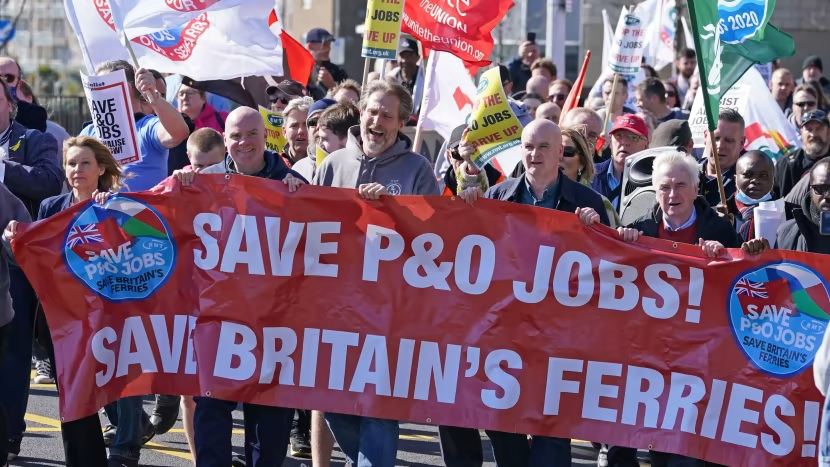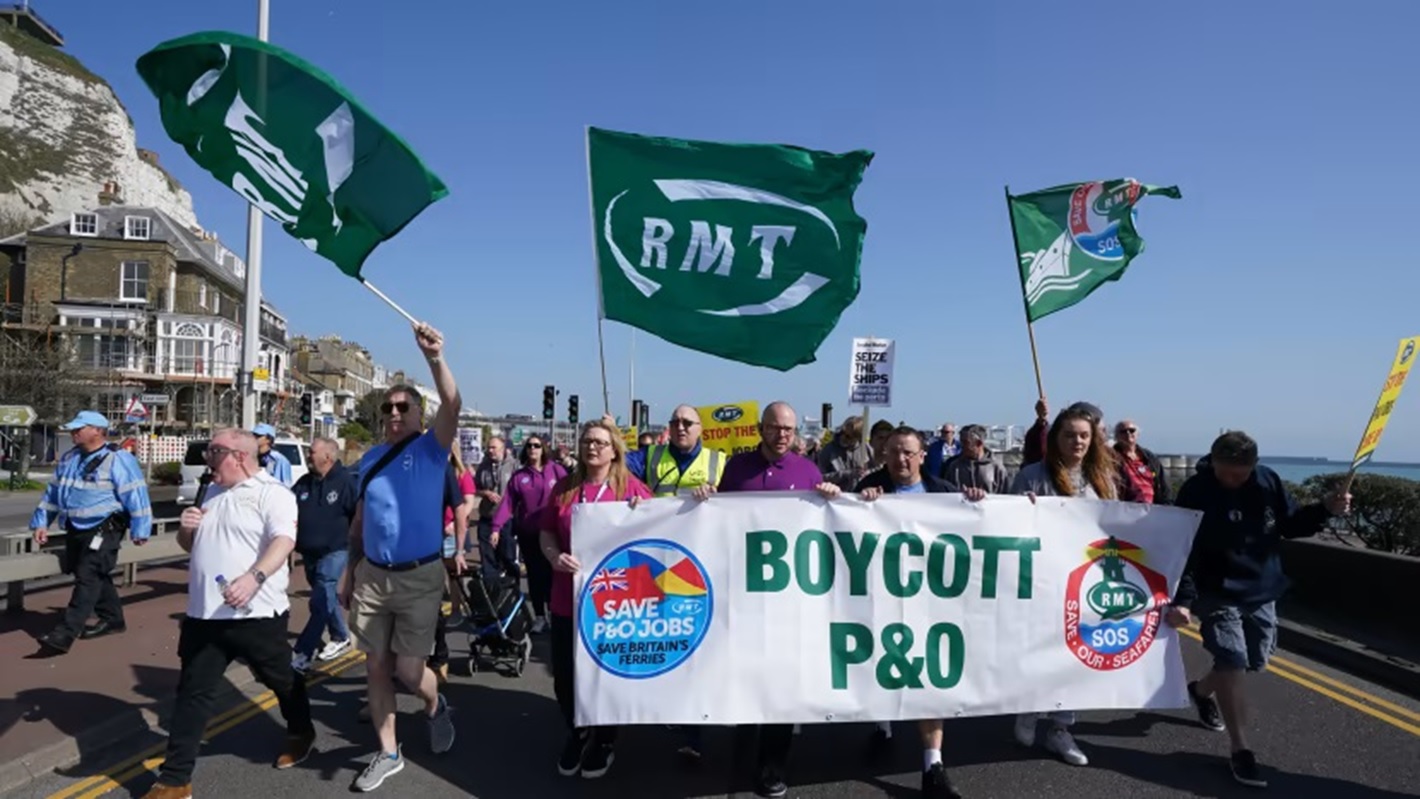by Barry Casebeer
In the UK on 17 March, the shipping company P&O (Peninsular and Oriental) suddenly dismissed 800 seafaring staff, workers ranging from engineers to Ensigns. The company informed them of their sacking in various ways, including a “three-minute pre-recorded” video call, a phone call, email, or text message. Backed by trade unions, the National Union of Rail, Maritime and Transport Workers (RMT) and Nautilus International, some staff occupied their ships in response, though they were later removed by privately-hired security who wore balaclavas and used handcuffs.
P&O replaced the staff with lower paid agency workers, who the BBC reported were being paid as little as £1.81 an hour, under a fifth of the UK national minimum wage. It seems the average pay for the new agency workers was around £5.50, just under two-thirds of the legal minimum.
P&O is ultimately owned by the royal family of Dubai, whose DP World is the parent company of P&O. The chairman and CEO is Sultan Ahmed bin Sulayem. Overall, DP World made $1.3bn profit last year; however, the component P&O has been incurring a loss. DP World is trying to force through unpopular changes so that P&O is ‘sustainable’ in the long run.
The case has sparked fierce condemnation, with government Ministers, including Prime Minister Boris Johnson and Transport Secretary Grant Shapps, saying the process was illegal and that P&O CEO Peter Hebblethwaite should resign. Before a Parliamentary Select Committee, Hebblethwaite admitted breaking the law but boasted that he “would do it again.” The government have threatened unlimited fines, though it is unclear in the context of intense legal wrangling what will happen, or even if the government is simply waiting for the issue to die down.
Hundreds of protesters have demonstrated in the port cities of Dover, Hull, Liverpool, and Larne. Dover’s Conservative MP Natalie Elphicke tried to march alongside them but was shouted at by workers who criticised her for voting for ‘fire and rehire’ in Parliament the previous year. ‘Fire and rehire,’ the name given to the process whereby employers sack staff and then rehire them on new contracts with terms and conditions less favourable than the original agreement, is a perfectly legal practise in UK law.
A Private Members Bill submitted to Parliament by Labour MP Barry Gardiner that would have tightened the law was defeated by Conservative Ministers whipping their Party into line. Elphicke supported the government, and so was partly responsible for allowing P&O’s actions to occur, something she now ‘condemns.’ The only limit on ‘fire and rehire’ is that one is supposed to be notified a month in advance. P&O feared the consequences of doing that, but they did notify the government in November 2021, who green-lit the decision, so P&O may be able to argue this as a defence. Whatever the outcome, keeping up the public pressure can help sway legal rulings.

P&O’s actions have concerned other seafarers who fear their terms of employment may also be drastically altered if P&O get away with this. Moreover, there are ramifications for the wider workforce in the current context, where appealing to the European Court of Justice against maltreatment is no longer an option. It seems the case that workforces are exposed to a substantial assault on their wages by capital, as companies seek to increase profit margins in the wake of losses incurred during the Covid lockdowns. Nevertheless, it would be foolhardy to think this case is unique or new.
British Gas dismissed hundreds of engineers earlier in 2021, who had refused to accept a pay cut and longer, more antisocial hours. Others accepted jobs on the new terms. Sports Direct have used workers on zero-hours contracts (where no working hours are guaranteed), leaving those employees incredibly vulnerable. In the ‘gig economy’ companies such as Uber do not grant holiday entitlements or sick pay. Burger King and Tesco superstores use labour without paying for it – the individuals concerned are in receipt of welfare benefits paid by the state instead. It’s like back in the nineteenth century, when Factory Commissions were very busy indeed fining companies for over-exploitation and inhumane working conditions.
Writing in the Guardian, left-wing journalist Owen Jones regards companies’ bad behaviour as ‘Gangster Capitalism.’ However, it would be wrong to distinguish P&O’s atrocious behaviour from ‘capitalism-as-normal.’ P&O is not alien to an otherwise benign, socially progressive economy. Rather, this is capitalism in its essence. If a company is to make a profit, it has to exploit its workforce. Maybe we could say what P&O have done is ‘extreme,’ but extremity here is just one end of an already problematic entity. The problem is not just one of ‘bad bosses’ because any ‘good boss’ can become a ‘bad boss,’ no matter what their starting intentions were. The decisive factor is not morality but whether or not market conditions have become more difficult. Indeed, this brochure for capitalists pin-points the ways in which ‘good’ can become ‘bad’ in relation to ‘human resources’ and ‘public relations.’ So, journalists such as Owen Jones should be using P&O’s crass way of going about things as a way of lifting the veil on the failures of the system as a whole, patterns established long ago.
British India Steam Navigation, who amalgamated with P&O in 1914, used Indian labour rather than British counterparts on the grounds they were cheaper and lacked legal rights. As Ian Jack wrote in the Guardian newspaper:
What recommended them most to shipowners, of course, was their cost compared with British seamen. They accepted lower wages, slept in poorer lodgings, and ate cheaper food; and all this because acts of parliament exempted them from the laws governing the terms and conditions of their British equivalents. Their employment, which had begun on ships plying the sea lanes of the Indian Ocean, caused alarm among European seamen when it spread westwards to ships in the Atlantic trades. In the 1880s, newly formed maritime unions began to agitate and protest. In 1892, fighting a campaign to become the Tory MP for Barrow in Furness, the shipowner Charles Cayzer found himself barracked at meetings by chants of “coolies, coolies” and described by rivals as “the coolie candidate” because his extensive fleet, the Clan Line, employed so many Indians and deprived honest Britons of jobs.
Such sentiments—viewing things nationalistically rather than in concrete, material terms where economic interests between workers and capitalists are at loggerheads—are, sadly, sentiments that have not died. Despite much internal diversity training, nationalism is still part of trade unionism, and this is inhibiting their potential for success. As Socialist Worker reports, ‘There is a huge danger that the campaign goes down the road of xenophobia and racism. [The RMT’s Mick] Lynch spoke of the plan to sack UK seafarers and replace them with foreign labour.’
Nautilus union general secretary Mark Dickinson spoke of a ‘betrayal of British workers.’ If we are to defend workers against an assault from private industry, it is absolutely essential for workers in all countries to unite—nationalistic sloganeering is counter-productive. Furthermore, through nationalism, workers are appealing to something they share with P&O CEO Peter Hebblethwaite: his ‘Britishness’; they are not identifying with each other. So nationalism becomes a form of pleading, a defensive appeal to a mythical shared interest with your boss.

RMT-led protest in Dover. Credit: Press Association
Scapegoating Johnny Foreigner has a long history in the trade union movement. An academic study from 1986 said, ‘history shows the record of the trade union movement to be characterised at worst by appalling racism and often by an indefensible neglect of the issues of race and equal opportunity. Between the two world wars, there was an effective colour bar in British industry, supported openly by individual unions. Apparently the greater “tolerance” which operated towards back workers during both wars was clearly understood by white workers and their unions to be temporary.’
Of course, modern unions may claim this is ancient history. But neither the RMT or Nautilus have any BAME representation in their leadership. Indeed, it wasn’t until 1992 that Britain experienced its first Black union leader. Bill Morris was General Secretary of the Transport and General Workers Union until 2003. Unions are intertwined with the Labour Party, which has a right-wing policy on immigration. And, in 2009, unions struck against Italian and Portuguese workers under the slogan ‘British jobs for British workers,’ which had been a phrase of then-Labour Prime Minister Gordon Brown. Whilst racism does not originate in trade unions, they often perpetuate rather than challenge it.
When labour-power is a commodity, workers are incredibly vulnerable. They are jostling against each other, advertising their individual virtues in order to be hired. Appealing to a sense of Britishness is a marketing ploy by labour. It does not challenge the capitalist economic structure; it reinforces it. So any protest on that basis is bound to be a flash in the pan, rather than something durable that can achieve its aims.
This pickle is understandable in the context of legal hostility to worker’s rights. Currently, strike action has to be officially balloted for and notice given far in advance. Secondary picketing, where workers from one company strike in support of those from another, is illegal, which is a major obstacle to uniting the working class as a force capable of changing the world. The Alliance for Worker’s Liberty say, ‘what the hell, do it anyway.’ We applaud their courage. But to avoid small strikes from being ‘picked off’ by the police, legal change is required as part of the process of creating meaningful solidarity. With a greater level of interaction, the nationalism in the unions would die off, allowing their progressive potential to shine.
————
Barry Casebeer is a freelance journalist based in the UK.


The legal powers-that-be announced today there will be no prosecutions over P&O’s law breaking. This sends a green light to other companies that they can get away with whatever they want and they will not be held to account. The immediate future just got very scary for workers. There is no justice in this society, no real civilization. https://www.bbc.co.uk/news/uk-62613625